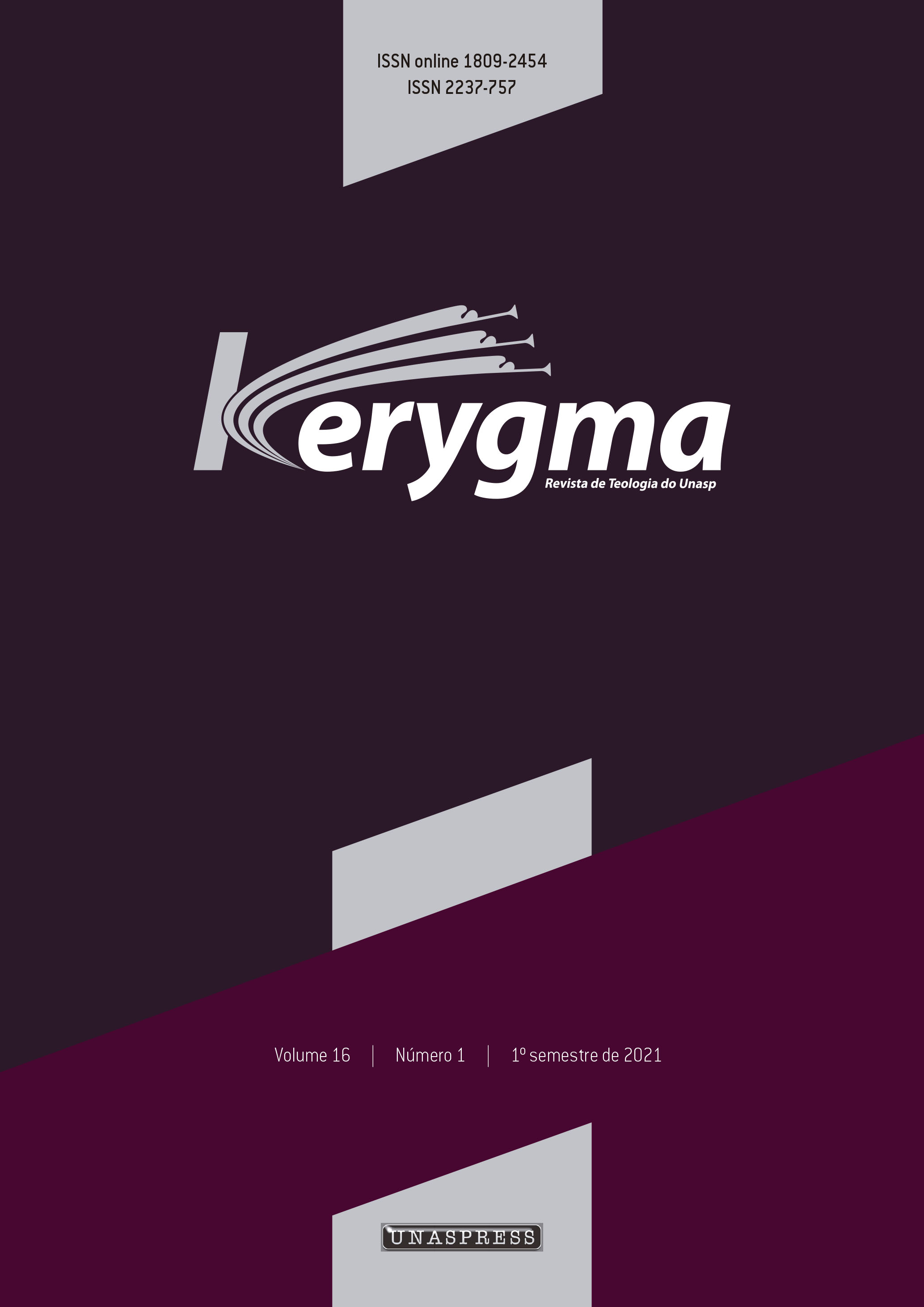Helenismo na patrística
Epicurismo e Estoicismo na visão de Orígenes de Alexandria sobre Deus
DOI:
https://doi.org/10.19141/1809-2454.kerygma.v16.n1.p53-64Keywords:
Helenismo, Epicurismo, Estoicismo, Deus, OrígenesAbstract
As filosofias helênicas tiveram larga influência no mundo greco-romano. Teólogos da era patrística são um exemplo desse alcance helenístico até mesmo na teologia da igreja cristã primitiva. Orígenes, teólogo cristão do terceiro século, em seus escritos, apresenta conceitos ontológicos helenistas, que podem ser vistos na teologia oriental depois dele. O objetivo deste estudo é analisar a influência do epicurismo e o estoicismo, duas escolas filosóficas do helenismo, na visão de Deus de Orígenes e sua implicação na contemporaneidade. Para o desenvolvimento do presente trabalho foi utilizado o método de análise bibliográfica. Dentre os autores pesquisados destaca-se Geovanne Reale e Justo González. A pesquisa conclui que Orígenes foi influenciado pelo neoplatonismo, a filosofia corrente em Alexandria na sua época, sistematizada com bases estoicas. O neoplatonismo posteriormente influenciou Agostinho, e a teologia cristã latina medieval e atual.
Downloads
References
AUBENQUE, P.; BERNHARDT, J.; CHÂTELET, F. A filosofia pagã. 2 ed. Rio de Janeiro: Zahar
editores, 1981.
CAIRNS, E. O Cristianismo através dos séculos. P. 107-145: 3.ed. São Paulo: Vida Nova, 1998.
CANALE, F. Doutrina de Deus. In: DEREDEN, R. (Ed.). Tratado de Teologia Adventista do Sétimo Dia. Tatuí: Casa Publicadora Brasileira, 2011.
CASTAGNOLA, L.; PANDOVANI, H. História da filosofia. 2 ed. São Paulo: Edições melhoramentos, 1956.
EUSÉBIO DE CESARÉIA. História eclesiástica. São Paulo: Novo século, 2002.
GEISLER, N.; FEINBERG, P. D. Introdução à filosofia: uma perspectiva cristã. São Paulo: Vida Nova, 1996.
GONZÁLEZ, J. L. História ilustrada do cristianismo. 2 ed. São Paulo: Vida Nova, 2011.
GONZÁLEZ, J. L. Uma história do pensamento cristão. São Paulo: Cultura Cristã, 2004;
O’KEEFE, T. Epicureanism. London; New York: Routledge, 2010.
KELLY. J. N. D. Patrística. São Paulo: Vida Nova, 2015.
MARCONDES, D. Iniciação à história da filosofia. 13 ed. Rio de Janeiro: Joege Zahar Ed., 2010.
MATOS, A. S. de M. C. A Phýsis como fundamento do sistema filosófico estóico. Kriterion, Belo Horizonte , v. 51, n. 121, p. 173-193, Jun. 2010.
MONDOLFO, R. O pensamento antigo. 2 ed. São Paulo: Editora Mestre Jou S.A, 1966.
ORÍGENES. Tratado sobre os princípios. São Paulo: Paulus, 2012.
REALE, G. História da filosofia. vol.1. São Paulo: Paulus, 2003.
RUSSEL, B. História da Filosofia Ocidental: Livro 1 A Filosofia Antiga. Rio de Janeiro: Editora Nova fronteira participações S.A, 2015
SELLARS, J. Stoicism. London; New York: Routledge, 2006.
SPINELLI, M. Helenização e Recriação de sentidos: A filosofia na Época da Expansão do Cristianismo- Séculos II, III e IV. Porto Alegre, Edipucrs, 2002.
TEIXEIRA, C. F. Teologia e filosofia. Engenheiro Coelho: Academia Teológica, 2015.
TRIGG, J. Origen. London and New York: Routledge, 2012.
WALKER, W. História da igreja cristã. 3. ed. São Paulo: ASTE, 2015.
ZUKOWSKI, J. O Espírito Santo na Patrística e no período medieval. In: TIMM, A. R.; SIQUEIRA, R. W. Pneumatologia: Pessoa e Obra do Espírito Santo. Engenheiro Coelho: Unaspress, 2017.
Downloads
Published
How to Cite
Issue
Section
License
Copyright (c) 2021 Kerygma

This work is licensed under a Creative Commons Attribution 4.0 International License.
Copyright Statement
In summary, authors who publish in Kerygma must agree that:
-
Once accepted for publication, the copyright of the articles is transferred to Kerygma.
-
All third-party materials used in the text must be properly referenced.
-
Authors must hold the rights or permissions for the use of images, tables, and other graphic materials.
-
Authors guarantee that the submitted manuscript is original, of their own authorship, and has not been submitted or published elsewhere.
-
The opinions and ideas expressed in the texts are the sole responsibility of the authors and do not necessarily reflect the views of the journal.
-
The editors reserve the right to make textual revisions and adjustments in accordance with the journal’s editorial standards.
-
Authors retain copyright and grant the journal the right of first publication, with the work licensed under the Creative Commons Attribution–NonCommercial 4.0 International License.
-
Authors authorize the reproduction and adaptation of the material by Kerygma, with the authors’ participation or express authorization when required.
-
The journal may distribute, store, archive, and make the articles available through any physical or digital means, whether free of charge or paid.
-
Authors may enter into separate agreements for the non-exclusive distribution of the published version of the work, provided that the original publication in Kerygma is acknowledged.
-
Full or partial reproduction of the texts in other publications requires prior written authorization from the editor.
-
Authors are permitted and encouraged to publish and distribute their work online (e.g., in institutional repositories or personal webpages) before or during the editorial process, as this may increase the visibility and citation impact of the published work.














